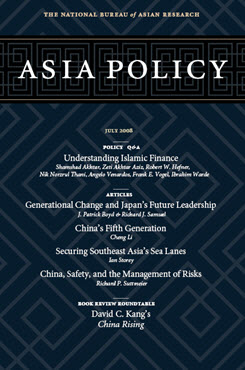Prosperity's Children
Generational Change and Japan's Future Leadership
This study measures generational differences in the views of Japanese legislators across three key areas of Japan’s political discourse—economic policy, security policy, and cultural issues related to right-wing nationalism. The study then explores the policy implications of these differences through three plausible midterm scenarios.
This is an abridged version of a longer research paper that appears in the NBR report Emerging Leaders in East Asia: The Next Generation of Political Leadership in China, Japan, South Korea, and Taiwan.
EXECUTIVE SUMMARY
This study measures generational differences in the views of Japanese legislators across three key areas of Japan’s political discourse—economic policy, security policy, and cultural issues related to right-wing nationalism. The study then explores the policy implications of these differences through three plausible midterm scenarios.
MAIN FINDINGS
The study of generational differences provides only a limited explanation for the dynamics of Japanese politics. (1) Generational differences are most significant in domestic economic policy, where the eldest cohort favors maintaining the institutions of Japanese-style capitalism more than both younger cohorts. (2) Although the youngest cohort favors more muscular security policies than do the elder cohorts, only one instance of this generational difference proves statistically significant. (3) Even though there are no statistically significant differences between generations on cultural issues related to right-wing nationalism—an unexpected finding in itself—that the midcareer cohort, which is the primary object of this study, is more progressive than the other cohorts in this area is surprising.
POLICY IMPLICATIONS
- Given that generational differences in two of the three most salient dimensions of Japanese politics are statistically significant in only a few instances, the findings of this study do not support expectations for impending policy transformation based on generational change.
- Japanese leaders are likely to continue trying to reform the domestic economy, especially in areas such as fiscal policy and public works.
- U.S. and Japanese alliance managers should expect continued support from Tokyo for enhanced Japanese roles and missions over the medium term despite an increasing number of questions over U.S. motives and intentions.
- Because the range of security and economic policy preferences is less extreme than is sometimes presumed, U.S. policymakers should not overreact when Japanese leaders question U.S. policies.
- Barring an unforeseen event, the study finds no evidence that right-wing nationalism in Japan will become a major problem for U.S.-Japan relations.
About Asia Policy
Asia Policy is a peer-reviewed scholarly journal presenting policy-relevant academic research on the Asia-Pacific that draws clear and concise conclusions useful to today’s policymakers. Asia Policy is published quarterly in January, April, July, and October and accepts submissions on a rolling basis. Learn more


